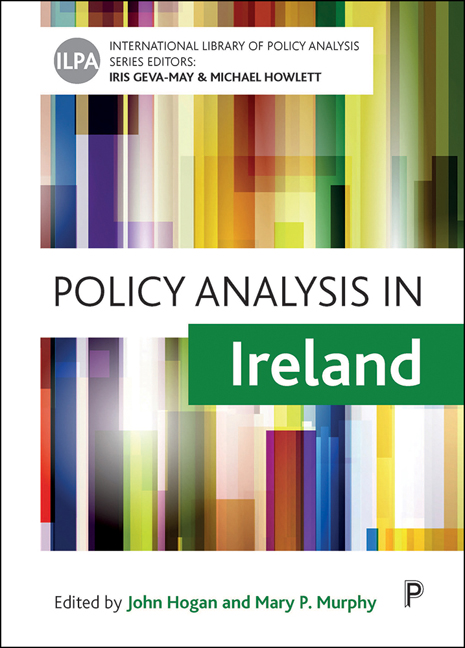Book contents
- Frontmatter
- Contents
- List of figures, tables and boxes
- List of abbreviations
- Notes on contributors
- Editors’ introduction to the series
- Acknowledgements
- Foreword
- Preface
- one Contextualising policy analysis in Ireland
- Part One: History, styles and methods of policy analysis in Ireland
- Part Two: Policy analysis at various levels of government: from local to the EU
- Part Three: Think tanks, interest groups, political parties and gender-based policy analysis
- Part Four: The public, science and the media: the wider policy analysis environment in Ireland
- Index
eleven - Thinks tanks and their role in policy making in Ireland
Published online by Cambridge University Press: 18 December 2021
- Frontmatter
- Contents
- List of figures, tables and boxes
- List of abbreviations
- Notes on contributors
- Editors’ introduction to the series
- Acknowledgements
- Foreword
- Preface
- one Contextualising policy analysis in Ireland
- Part One: History, styles and methods of policy analysis in Ireland
- Part Two: Policy analysis at various levels of government: from local to the EU
- Part Three: Think tanks, interest groups, political parties and gender-based policy analysis
- Part Four: The public, science and the media: the wider policy analysis environment in Ireland
- Index
Summary
Introduction
Ireland, like most other ‘developed’ countries, draws on a range of sources to influence the design of public policy. Alongside political and administrative influences, a variety of civil society, not-for-profit, academic and private sector actors seek to access, influence, advise, inform and, sometimes, embarrass those in power. This chapter focuses on one particular group, think tanks, organisations that seek to contribute to policy analysis through research, policy development and, in some cases, advocacy. The first part of the chapter reviews the international experience on think tanks. Here, the question of what constitutes a think tank is discussed, different types of think tanks are introduced and the complex question of assessing think tank influence and contribution to policy analysis is considered. The second part of the chapter turns to Ireland, mapping the Irish think tank landscape and categorising Irish think tanks by age, type and resource base. It also considers the issue of influence of think tanks on Irish policymaking and explores data relevant to a number of key influence indicators.
The broader picture
It is generally agreed that think tanks are not-for-profit organisations that engage in research on issues of public policy and communicate their research findings, publicly or otherwise, with a view to influencing and enhancing the capacity of policymakers to make informed decisions (Hart and Vromen, 2008; Shaw et al, 2015; McGann, 2018). The research undertaken by think tanks is often more anticipatory, longer term and deeper than may be possible for those preoccupied with the day-to-day realities of policy design and delivery. Think tanks advocate for policy options ‘through intellectual argument rather than through behindthe-scenes lobbying’ or other forms of advocacy from the perspective of the lived experience of the problem under analysis (Pautz, 2010, p 276).
Think tanks are usually independent of government – legally, financially and/or intellectually (Stone and Ullrich, 2003). However, as the geographic spread of think tanks has widened, the relevance of independence as a criteria has been diluted, with think tanks being linked to political parties, to funders, and sometimes to government itself, as in the case of the rapid expansion of think tanks in China (Stone, 2007; Sundararaman, 2008). Think tanks often enjoy some degree of longevity, having adequate resources to enable them to employ sufficient and credible human resources to carry out research and dissemination functions (Boucher and Hobbs, 2004).
- Type
- Chapter
- Information
- Policy Analysis in Ireland , pp. 157 - 170Publisher: Bristol University PressPrint publication year: 2021

